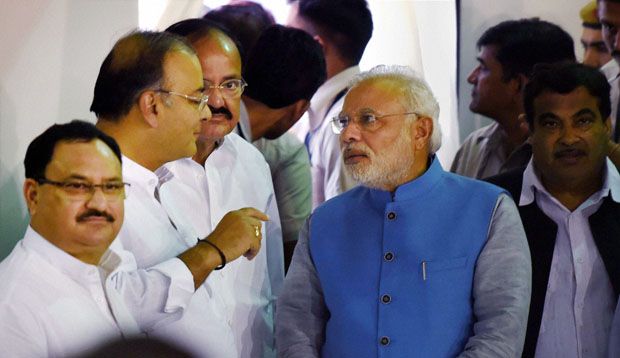This Friday by skipping the Iftaar party hosted by the President, this is the 3rd consecutive year when the sitting PM has abstained from doing so. This year however, unlike last 2 years not a single cabinet minister was present either. Goes without saying that message is indeed loud and clear and that the current dispensation led by Mr. Narendra Modi do not believe in the practice of government participating in tokenism and symbolism that Iftaar parties have come to stand for over the years in Indian political circles. However what does they stand for ???
History of Iftaar Parties in India
Prime Minister Jawaharlal Nehru was one of the first to start hosting these get-togethers, more as a personal outreach to his friends and acquaintances rather than a political act. Reportedly he would call his friends over to the All India Congress Committee headquarters, then situated at 7 Jantar Mantar Road in New Delhi, at the designated time of breaking the fast.
It was in the late 1970s that the political iftar came into its own. The then Uttar Pradesh Chief Minister, Hemvati Nandan Bahuguna, is credited with adding an element of State sponsorship to the event. Riots had broken out between Shias and Sunnis in Lucknow and Bahuguna, in a bid to broker peace, invited influential Shia leader Ashraf Hussain to his bungalow for a meal. Hussain refused on the ground that he was fasting. Bahuguna requested Hussain to break his fast with him and Hussain accepted the offer.
This episode is said to have set the trend for political iftars in India. Then Prime Minister Indira Gandhi and her advisors saw the potential in this concept and began hosting the event in Delhi sponsored by central government. It soon became part of Delhi’s social calendar and was followed by future PMs like Rajiv Gandhi as well as smaller parties that aspired for community’s votes.
When the BJP-led National Democratic Alliance came to power at the Centre in 1998 albeit on back of a stretched and wayward coalition it was expected that this tradition will finally see its end. But Prime Minister Atal Bihari Vajpayee chose to honour it. The last iftar he hosted, before ill health forced him to retreat from public life, was in 2005, a year after he was voted out of power.
All these years when this mindless expenditure was being sponsored by government nobody stopped to ponder about these basic questions on this practice which lot of common citizens wanted to know…
- What is government doing celebrating religious festivals? – India is a secular country and every religion holds equal value as enshrined by Indian constitution. Why did government decide to indulge only a particular religious group and not all?Why the president should throw a party for Iftar but not for Diwali or Holi ? Guru purab or Christmas?
- Who is benefiting out of these grand parties ? – Such parties are held for political bigshots , celebs and media personalities. How do they contribute in well being of any regular muslim citizens of the country ? Even if the idea is to feast then why it can’t be done at a scale or a manner which can help common citizens ?
- Why feast in a month of abstinence? – Turns out the grand iftaar parties is against the spirit of Ramdan.
Iftar is certainly not a party time or the occasion to build or break political alliances. It is a moment of introspection for the faithful, sandwiched as it is between two prayers. It is the time to seek forgiveness, engage in introspection and supplication.
Now if the above is correct then why is this mindless spends have been fuelled year after year?
While nobody answered these questions above, Narendra modi lead government has thankfully stopped this practice and futile tradition. While it by no means is end to religious appeasement and symbolism that opposition will continue to showcase, it’s still an unapologetic and confident step in the right direction of keeping religion away from government.
